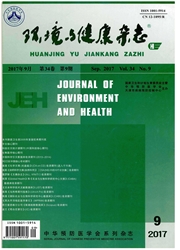

 中文摘要:
中文摘要:
目的探讨高铁乘务人员免疫功能状况及可能的影响因素。方法选择2012年11月至2013年7月北京铁路局石家庄客运段220名高铁乘务员为研究对象,并选择108名普速列车乘务员作为对照,采集静脉血检测细胞免疫功能。结果高铁动车组乘务员的CD3+CD4+CD8+、CD3+比例均低于普速列车组,石家庄-太原高铁动车组乘务员CD3+CD4+CD8+、CD3+CD4+CD8-、CD3-CD4+CD8+、CD3+比例均低于其他高铁线路组,≤20岁组的高铁乘务员CD3-CD4+CD8+比例高于21-、25~岁组,差异均有统计学意义(P〈0.05);不同乘务工龄的高铁乘务员各淋巴细胞亚群的差异均无统计学意义(P〉0.05)。结论高速动车、石家庄-太原高铁线路及年龄可能对高铁乘务员细胞免疫功能有影响。
 英文摘要:
英文摘要:
Objective To investigate the immune function and influncing factors of high-speed train crew members. Methods A total of 220 high-speed train crew members were chosen from November 2012 to July 2013 in Shijiazhuang Passenger Transport Section, Beijing Railway Administration, and 108 normal speed train crew members were chosen as the control. The basic data of personnel were collected and the immune function indicators were determined. Results The CD3 +CD4+CD8+, CD3+ proportions in high-speed train crew members were lower than normal speed train set, Shijiazhuang-Taiyuan high-speed train crew's CD3+CD4+CD8+, CD3+CD4+CD8-, CD3-CD4+CD8+, CD3+ proportions were lower than the other high-speed rail line group, CD3-CD4+CD8+ ratio in under 20 years old group of high-speed train was significantly higher than those in 21-, 25- years old group (P〈0.05). The seniority of work was not the influencing factor for lymphocyte subpopulation. Conclusion High-speed trains, Shijiazhuang-Taiyuan high-speed rail and age may impact high-speed rail crew members' cellular immune function.
 同期刊论文项目
同期刊论文项目
 同项目期刊论文
同项目期刊论文
 期刊信息
期刊信息
